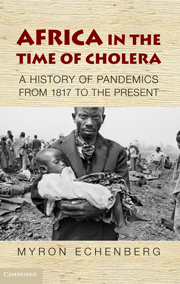Book contents
- Frontmatter
- Contents
- List of Figures, Maps, and Tables
- Acknowledgments
- List of Abbreviations
- Introduction
- PART ONE THE FIRST SIX PANDEMICS, 1817–1947
- PART TWO THE SEVENTH PANDEMIC
- Introduction
- 5 Medical Changes
- 6 The Seventh Cholera Pandemic in Africa
- 7 Risk Factors
- 8 Risk Factors
- 9 Zimbabwe, Portrait of Cholera in a Failed State
- 10 Cholera Today
- Bibliography
- Index
- Books in this series
5 - Medical Changes
Published online by Cambridge University Press: 05 June 2012
- Frontmatter
- Contents
- List of Figures, Maps, and Tables
- Acknowledgments
- List of Abbreviations
- Introduction
- PART ONE THE FIRST SIX PANDEMICS, 1817–1947
- PART TWO THE SEVENTH PANDEMIC
- Introduction
- 5 Medical Changes
- 6 The Seventh Cholera Pandemic in Africa
- 7 Risk Factors
- 8 Risk Factors
- 9 Zimbabwe, Portrait of Cholera in a Failed State
- 10 Cholera Today
- Bibliography
- Index
- Books in this series
Summary
The cholera pathogen has changed in the past thirty years and so has scientific research on the subject. Indeed, the standard text on cholera now describes its poison as “one of the best understood of all bacterial toxins.” Two Indian scientists working at the Medical College of Calcutta in the late 1950s led the way in this breakthrough in the chemistry of cholera. S.N. De and P.K. Dutta were the first to demonstrate how cholera toxins did their damage. Water and salts pass freely through the intestinal wall into the gut to keep fecal matter in the bowels moist. The cholera toxin destroys this smooth process by causing overproduction of enzymes and, in effect, flooding the large intestine, draining chloride and bicarbonate ions. Cells worst affected are those in the nerves lining the gut. Loss of salts also causes convulsions in the muscles of the abdomen and legs.
A better grasp of how the cholera toxin worked was only one breakthrough. A series of new understandings involved the kinds of strains of the cholera vibrio in the environment, and how cholera survived outside the human body.
Scientists recognize the existence of several strains of Vibrio cholerae with a similar effect. As we have seen, the so-called classic Vibrio cholerae, possibly responsible for all six of the earlier pandemics, gave way to Vibrio cholerae 01 El Tor during the Seventh Pandemic.
- Type
- Chapter
- Information
- Africa in the Time of CholeraA History of Pandemics from 1817 to the Present, pp. 91 - 108Publisher: Cambridge University PressPrint publication year: 2011



